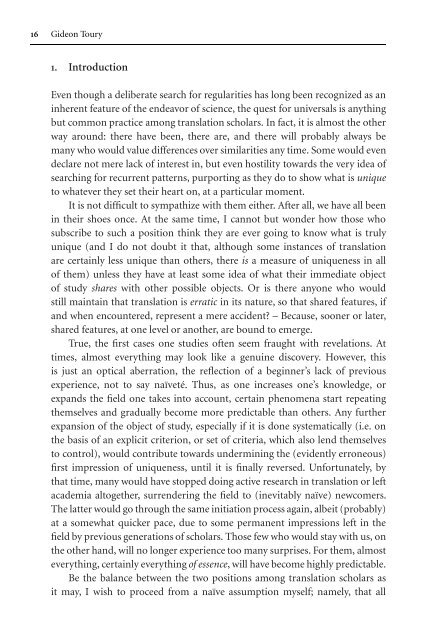Translation Universals.pdf - ymerleksi - home
Translation Universals.pdf - ymerleksi - home
Translation Universals.pdf - ymerleksi - home
Create successful ePaper yourself
Turn your PDF publications into a flip-book with our unique Google optimized e-Paper software.
16 Gideon Toury<br />
1. Introduction<br />
Even though a deliberate search for regularities has long been recognized as an<br />
inherent feature of the endeavor of science, the quest for universals is anything<br />
but common practice among translation scholars. In fact, it is almost the other<br />
way around: there have been, there are, and there will probably always be<br />
many who would value differences over similarities any time. Some would even<br />
declare not mere lack of interest in, but even hostility towards the very idea of<br />
searching for recurrent patterns, purporting as they do to show what is unique<br />
to whatever they set their heart on, at a particular moment.<br />
It is not difficult to sympathize with them either. After all, we have all been<br />
in their shoes once. At the same time, I cannot but wonder how those who<br />
subscribe to such a position think they are ever going to know what is truly<br />
unique (and I do not doubt it that, although some instances of translation<br />
are certainly less unique than others, there is a measure of uniqueness in all<br />
of them) unless they have at least some idea of what their immediate object<br />
of study shares with other possible objects. Or is there anyone who would<br />
still maintain that translation is erratic in its nature, so that shared features, if<br />
and when encountered, represent a mere accident? – Because, sooner or later,<br />
shared features, at one level or another, are bound to emerge.<br />
True, the first cases one studies often seem fraught with revelations. At<br />
times, almost everything may look like a genuine discovery. However, this<br />
is just an optical aberration, the reflection of a beginner’s lack of previous<br />
experience, not to say naïveté. Thus, as one increases one’s knowledge, or<br />
expands the field one takes into account, certain phenomena start repeating<br />
themselves and gradually become more predictable than others. Any further<br />
expansion of the object of study, especially if it is done systematically (i.e. on<br />
the basis of an explicit criterion, or set of criteria, which also lend themselves<br />
to control), would contribute towards undermining the (evidently erroneous)<br />
first impression of uniqueness, until it is finally reversed. Unfortunately, by<br />
that time, many would have stopped doing active research in translation or left<br />
academia altogether, surrendering the field to (inevitably naïve) newcomers.<br />
The latter would go through the same initiation process again, albeit (probably)<br />
at a somewhat quicker pace, due to some permanent impressions left in the<br />
field by previous generations of scholars. Those few who would stay with us, on<br />
the other hand, will no longer experience too many surprises. For them, almost<br />
everything, certainly everything of essence, will have become highly predictable.<br />
Be the balance between the two positions among translation scholars as<br />
it may, I wish to proceed from a naïve assumption myself; namely, that all
















